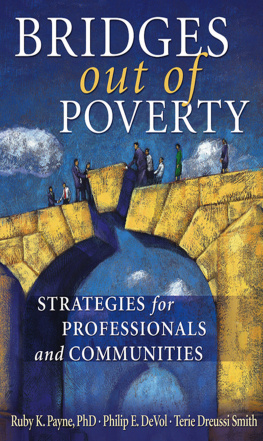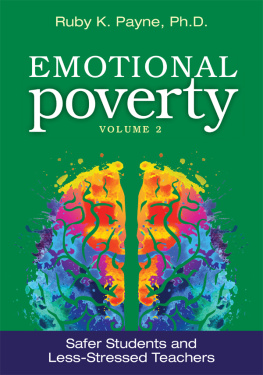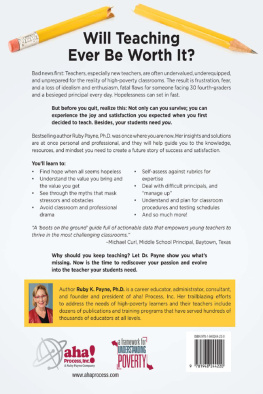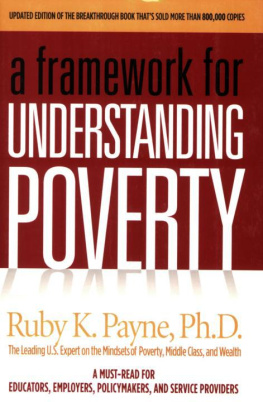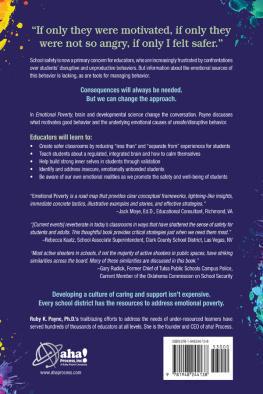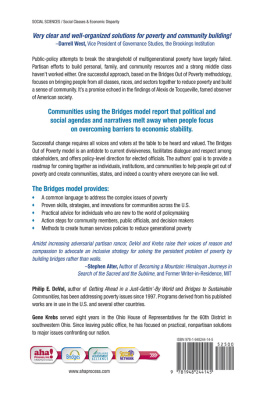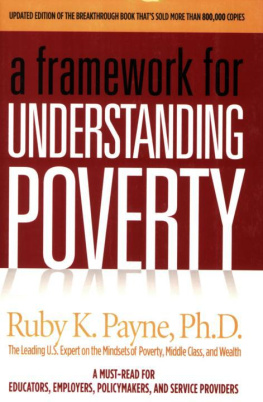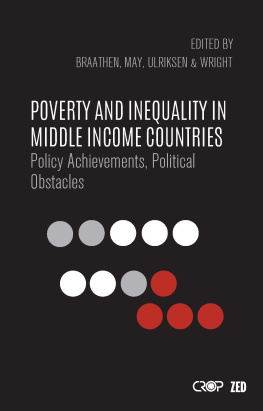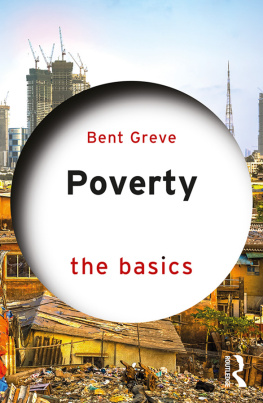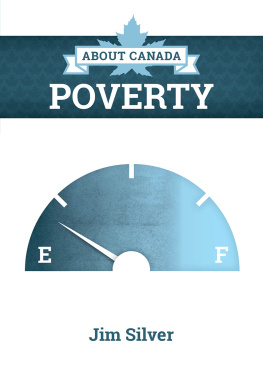
STRATEGIES
FOR PROFESSIONALS
AND COMMUNITIES
Ruby K. Payne, Ph.D.
Philip DeVol
Terie Dreussi Smith

Bridges Out of Poverty: Strategies for Professionals and Communities. Revised edition. 2001 by Ruby K. Payne, Philip DeVol, & Terie Dreussi Smith. Revised 2005, 2006, 2009.
All rights reserved. No part of this book may be reproduced in any manner whatsoever without written permission, except in the case of brief quotations embedded in critical articles and reviews. For information, address: aha! Process, Inc., P.O. Box 727, Highlands, TX 77562-0727; fax (281) 426-5600. Website: www.ahaprocess.com
Printed in the United States of America
Book design by Sara Patton
Payne, Ruby K., DeVol, Philip, & Dreussi Smith, Terie.
Bridges Out of Poverty: Strategies for Professionals and Communities by Ruby K. Payne, Philip DeVol, & Terie Dreussi Smith 2001. 296 pp.
Bibliography pp. 279285
ISBN 10:1-934583-35-9
ISBN 13: 978-1-934583-35-7
1. Education 2. Sociology 3. Title
Grateful acknowledgment is made to the following copyright holders for permission to use their copyrighted material:
Bantam Books, for quotations from pp. x-xi, 8,11,1618,108, and 202 of Convicted in the Womb by Carl Upchurch. 1996 by Carl Upchurch. Used by permission of Bantam Books, a division of Random House, Inc.
Bantam Books, for quotations from pp. 64,114115, and 160 of The Spirituality of Imperfection by Ernest Kurtz and Katherine Ketcham. 1992 by Ernest Kurtz and Katherine Ketcham. Used by permission of Bantam Books, a division of Random House, Inc.
Basic Books, for quotations from pp. 66, 68, 70, 8283, 85, 93,100,104105,107,116117, 119, and 122 of The War Against the Poor by Herbert J. Gans. 1995 by Herbert J. Gans. Reprinted by permission of Basic Books, a member of Perseus Books, L.L.C
HarperCollins Publishers, for quotations from pp. 157158 of Data Smog by David Shenk. 1997 by David Shenk. Reprinted by permission of HarperCollins Publishers, Inc.
HarperFlamingo, for quotations from pp. 10,178, and 265 of Empress of the Splendid Season by Oscar Hijuelos. 1999 by Oscar Hijuelos. Reprinted by permission of HarperCollins Publishers, Inc.
Harper & Row Publishers, for quotations from p. 1 of Ill Quit Tomorrow by Vernon E. Johnson. 1973 by Vernon E. Johnson. Reprinted by permission of HarperCollins Publishers, Inc.
Jossey-Bass, for quotations from pp. 4, 89, and 1718 of Resilient Adults: Overcoming a Cruel Past by Gina OConnell Higgins. 1994 by Gina OConnell Higgins. Reprinted by permission of Jossey-Bass, Inc., a subsidiary of John Wiley & Sons, Inc.
Lancet Ltd., for quotations from pp. 237240 of Myths about the Treatment of Addiction by Charles P. OBrien and A. Thomas McLellan. Lancet, Volume 347, Number 896, January 27,1996. 1996 by The Lancet Ltd.
Legal Action Center, for quotations from p. 5 of Making Welfare Reform Work: Tools for Confronting Alcohol and Drug Problems Among Welfare Recipients, September 1997. 1997 by The Legal Action Center, Washington, DC, and New York, NY.
Paul H. Brookes Publishing Co., for quotations from pp. 113114,177, 204, and 209 of Meaningful Differences in the Everyday Experience of Young American Children by Betty Hart and Todd R. Risley. 1995 by Betty Hart. Used by permission of Paul H. Brookes Publishing Co.
Simon & Schuster, for quotations from pp. 3536,103104,127128, and 130 of The Redneck Manifesto by Jim Goad. 1997 by Jim Goad. Reprinted with the permission of Simon & Schuster.
Truman Talley Books/Dutton, for quotations from pp. 69, 79, 82,133, 241, 257258, and 327 of Managing in a Time of Great Change by Peter F. Drucker. 1995 by Peter F. Drucker. Used by permission of Dutton, a division of Penguin Putnam, Inc.
University of Iowa Press, for quotations from pp. 89 and 74 of Broken Heartland: the Rise of Americas Rural Ghetto by Osha G. Davidson. 1996 by Osha G. Davidson. Used by permission of The University of Iowa Press.
Acknowledgments

Thanks to Erma Morgan for pointing the way; Julie Miller and my wife, Susan, for their commitment to the project; and the members of the Life Skills Provider Network and Carol Curl for letting me experiment with my ideas. Thanks also to the many people who shared their stories with me. The staff of the Ashley Wornstaff Memorial Library was a great help in locating articles and books.
Philip DeVol
Thank you to the fine women who spent hours sharing their stories during our interviews. Your contributions truly enrich our understanding of how bridges out of poverty are built and traversed. Many thanks to Ben for his unfailing humor and continual encouragementand to my parents for providing an exceptionally resourceful home and family.
Terie Dreussi Smith
Ruby Paynes book A Framework for Understanding of Poverty clicked with us as it does with most people, particularly those who work closely with people who live at the bottom of the socioeconomic ladder. Ruby offered insight and encouragement to us as we worked on ways to apply her framework to the organizations that work with people in poverty. She continually offered us books and research from a variety of disciplines, always pushing us to a broader understanding of our topic and turning this project into a wonderful learning experience.
Phil DeVol, Terie Dreussi Smith
I sit on the splintery front porch of my cheesy Oregonian love shack and watch these people struggle to escape their ugliness, only to be recaptured by it again and again. Once you go trash, you never come back. The current climate offers me nothing but self-denial, so Im comfortable living in the past. Its like coming out of the closetIve come out of the trailer. I embrace the shame.
Jim Goad, The Redneck Manifesto
Makes me wanna holler.
Marvin Gaye, Singer
Anyone could tell it, anyone who had a momma who went eighteen years without a new dress so that her sons could have school clothes, who picked cotton in other peoples fields and ironed other peoples clothes and cleaned the mess in other peoples houses, so that her children didnt have to live on welfare alone, so that one of them could climb up her backbone and escape the poverty and hopelessness that ringed them, free and clean.
Rick Bragg, All Over but the Shoutin
Introduction

M uch has changed since this book was first published in 1999.
At that time the U.S. Welfare Reform Act of 1996 appeared to be producing impressive results. TANF (Temporary Assistance to Needy Families) caseloads had been cut in half, poverty and unemployment rates were at record lows, and there were substantial increases in the income levels of single-mother families. When the technology-driven economic boom ended in early 2000 it became apparent to poverty watchers, if not the media or the general public, that the gains were more a function of a strong economy than the welfare reform policy. When the attention of the nation shifted to terrorism and wars, people in poverty became invisible again, almost as invisible as they were in the 1950s.

